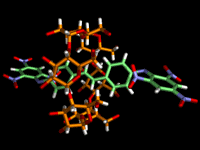|
Supramolecular Chemistry and Molecular Recognition
|
|
This work exploits cyclodextrins as molecular hosts. Our early work in this area resulted in pharmaceutical formulations that
are in everyday clinical use worldwide. In more recent studies modified cyclodextrins are being developed and exploited as
molecular scaffolds for the construction of catalysts, molecular ratchets, shuttles, tweezers and switches, and photochemical
devices.
|
|
|
 |
Effect of a urea linked β-cyclodextrin dimer to template formation of indirubin
C.J. Easton, J.B. Harper, and S.F. Lincoln: New J. Chem. 22, 1163
(1998).
|
|
|
Another application of cyclodextrins involves their use to control the assembly of the components of chemical
reactions, to facilitate the reactions and alter the outcomes. The cyclodextrins thereby act as reaction vessels, but at the
molecular level. In this regard, we have developed demonstration systems to change the regio- and stereo-selectivity
of reactions, and increase their rates by up to 100,000 times.
|
|
|
 |
Rotaxanes are mechanically interlocked supramolecular assemblies in which a ring component is threaded by a linear chain bearing bulky capping groups to prevent dethreading.
C.J. Easton, S.F. Lincoln, A.G. Meyer and H. Onagi: J. Chem. Soc. Perkin Trans. 1, 2501-2506 (1999).
|
|
|
We have also been exploring the synthesis of cyclodextrin
rotaxanes, catenanes, knots and daisy chains of various topologies. These form the basis of molecular devices such as
ratchets and motors, temperature and light sensors, photochemical frequency switches and molecular tweezers. Solid state
and solution studies of cyclodextrin host-guest complexes and rotaxanes show that these assemblies may be designed
to exploit the cyclodextrins as insulators of molecular filaments formed by the guests. This has potential, for example, in
the development of microelectronic systems.
|
|
|
 |
Dr. Hideki Onagi
(Research Fellow, September 2006-)
Research Topic: Molecular Machines
|
|
|
 |
Mr. Ka Heng Loh
(PhD Student, March 2010-)
Research Topic: Molecular machines
|
|
|
 |
Ms. Charlotte Rouse
(PhD Student, March 2012-)
Research Topic: Molecular Machines
|
|
|
|
Ms. Feiyu (Daisy) Zhang
(PhD Student, October 2013-)
Research Topic: Molecular Machines
|
|
|
|
Ms. Lisa Randone
(PhD Student, October 2013-)
Research Topic: Molecular Machines
|
|
|
Host-guest chemistry of linked β-cyclodextrin trimers and adamantyl substituted poly(acrylate)s in aqueous solution.
Nguyen H.-T., Pham D.-T., Lincoln S.F., Wang J., Guo X., Easton C.J., Prud’homme R.K., Polym. Chem. (2013), 4(3), 820–829. DOI: 10.1039/c2py20746j
Specific binding of a β-cyclodextrin dimer to the amyloid β peptide modulates the peptide aggregation process.
Wahlström A., Cukalevski R., Danielsson J., Jarvet J., Onagi H., Rebek J., Linse S., Gräslund A., Biochemistry (2012), 51(21), 4280–4289. DOI: 10.1021/bi300341j
 Milestone Paper Milestone Paper
The foundation of a light driven molecular muscle based on stilbene and α-cyclodextrin
Dawson, R., Lincoln, S. F., Easton, C. J., Chem. Commun., (2008), 3980-3982.
DOI:10.1039/b809014a
This work has been featured in following articles;
"Shining a light on molecular muscles" Chemical Science, 30 July 2008. Link
"Molecular machines: A light workout" Nature Chemistry, 1 August 2008. DOI:10.1038/nchem.44
Harnessing the Energy of Molecular Recognition in a Nanomachine Having a Photochemical On/Off Switch
Coulston, R. J., Onagi, H., Lincoln, S. F., Easton, C. J., J. Am. Chem. Soc., 128(46) (2006), 14750-14751.
DOI:10.1021/ja0651761
Installation of a Ratchet Tooth and Pawl to Restrict Rotation in a Cyclodextrin Rotaxane
Onagi, H., Blake, C. J., Easton, C. J. and Lincoln, S. F., Chem. Eur. J., 9, (2003), 5978-5988.
Modified Cyclodextrins. Scaffolds and Templates for Supramolecular Chemistry
Easton, C. J. and Lincoln, S. F., Imperial College Press, (1999), 1-293.
ISBN: 1860941443
β-Cyclodextrin as a Scaffold for Supramolecular Chemistry, to Reverse the Regioselectivity of Nitrile Oxide Cycloadditions
Meyer, A. G., Easton, C. J., Lincoln, S. F. and Simpson, G. W., J. Org. Chem., 63 (1998), 9069-9075.
|
|
|
Supramolecular chemistry of cyclodextrins
With S F Lincoln, M A Buntine, J Gerber, B L May, J Patrick [U Adelaide]
|
|
|